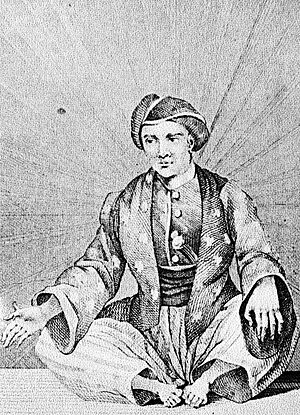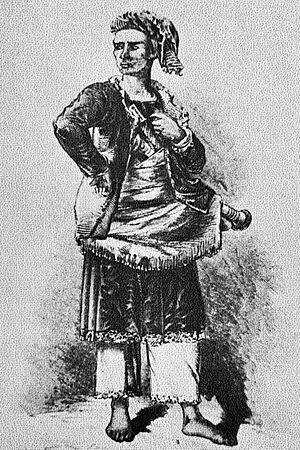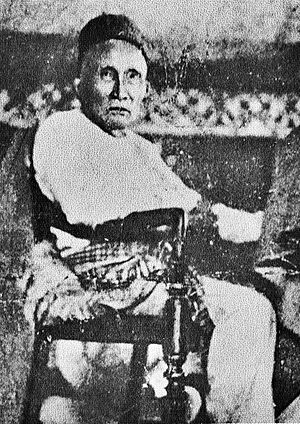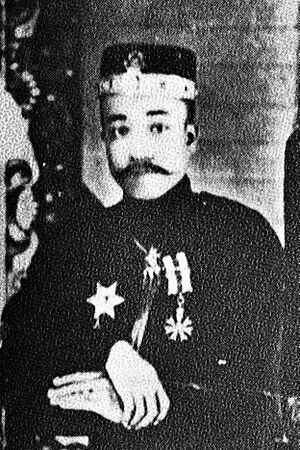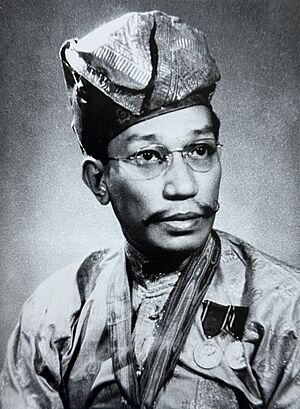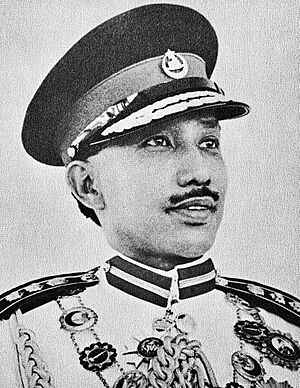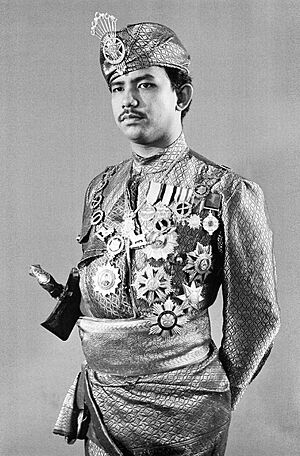List of sultans of Brunei facts for kids
Quick facts for kids Sultan of Brunei Darussalam |
|
|---|---|
| Sultan dan Yang Di-Pertuan Negara Brunei Darussalam | |
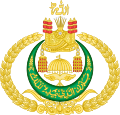
Arms of His Majesty the Sultan of Brunei Darussalam
|
|
| Incumbent | |
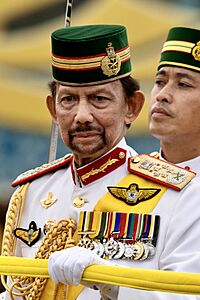 |
|
| Hassanal Bolkiah since 5 October 1967 |
|
| Details | |
| Style | His Majesty |
| Heir apparent | The Crown Prince Al-Muhtadee Billah |
| First monarch | Sultan Muhammad Shah |
| Formation | 1368 |
| Residence | Istana Nurul Iman, Bandar Seri Begawan |
The Sultan of Brunei is the main leader of Brunei. He is both the head of state (like a president or king) and the head of government (like a prime minister). Since Brunei became fully independent from the British in 1984, there has been only one Sultan. However, the royal family's history goes back to the 1300s. The Sultan is part of the House of Bolkiah, a royal family line that started with the first Sultan, Muhammad Shah. The Sultan's full title is His Majesty The Sultan and Yang di-Pertuan of Brunei Darussalam.
Contents
Meet the Sultans of Brunei
| No. | Portrait | Name | Reign start | Reign end | Key Facts |
|---|---|---|---|---|---|
| 1 | Muhammad Shah / Awang Alak Betatar | 1363/1368 | 1402 | He started modern Brunei in the 1360s after becoming a Muslim. He helped Brunei grow by taking land from the Majapahit Empire. He also made friends with Ming China. | |
| 2 | Abdul Majid Hassan / Maharaja Karna | 1402 | 1408 | In 1405, he visited China to meet the Yongle Emperor. He was the first foreign king to visit the emperor's court. He passed away in China in 1408 and was buried there. | |
| 3 | Ahmad / Awang Pateh Berbai | 1408 | 1425 | He continued to build strong ties with Ming China. He personally visited the Yongle Emperor to show loyalty and give gifts. | |
| 4 | Sharif Ali / Sultan Barkat (Blessed Sultan) | 1425 | 1432 | He was a religious leader from Mecca and was chosen as Sultan because he was good at Islamic teachings. He married the previous Sultan's daughter. | |
| 5 | Sulaiman | 1432 | 1485 | He helped spread Islam and built the city of Kota Batu. He made sure Brunei's laws were fair, even punishing royal family members who broke Islamic rules. He stepped down in 1485 for his son, Bolkiah. | |
| 6 | Bolkiah / Nakhoda Ragam (The Singing Captain) | 1485 | 1524 | His time as Sultan was Brunei's "golden age." He made the empire much bigger, including areas like Sarawak, Sabah, Manila, and the Sulu Archipelago. He also met European explorers like those from the Magellan expedition. | |
| 7 | Abdul Kahar | 1524 | 1530 | He started trading with the Portuguese. He also sent ships to expand Brunei's lands to places like Palawan and Luzon. He introduced a new money called pitis. He stepped down in 1530. | |
| 8 | Saiful Rijal | 1530 | 1581 | His reign included the Castilian War with Spain. The Spanish attacked Brunei's capital in 1578. He moved the capital and made Brunei's army stronger. | |
| 9 | Shah Brunei | 1581 | 1582 | He was the oldest son of Sultan Saiful Rijal. | |
| 10 | Muhammad Hasan | 1582 | 1598 | He improved Brunei's buildings and government. He also helped protect Sunni Islam in the Philippines and led military actions in Sarawak. He made sure Brunei had clear laws for daily life. | |
| 11 | Abdul Jalilul Akbar | 1598 | 1659 | He made peace and trade deals with the Spanish Empire. Dutch and English traders visited Brunei during his rule. The Dutch also started setting up trading posts in Borneo. | |
| 12 | Abdul Jalilul Jabbar | 1659 | 1660 | He became Sultan after a conflict with his older brother. He continued to use his father's strict Islamic laws. | |
| 13 | Muhammad Ali | 1660 | 1661 | He used Brunei's legal code during a difficult time. A family dispute led to his assassination, which started the Bruneian Civil War. | |
| 14 | Abdul Hakkul Mubin | 1661 | 1673 | He declared himself Sultan, but faced a civil war led by Muhammad Ali's nephew. He was defeated and executed, which ended the civil war. | |
| 15 | Muhyiddin | 1673 | 1690 | After the civil war, he worked to bring stability back to Brunei. He also tried to improve Brunei's relationships with other countries. | |
| 16 | Nasruddin | 1690 | 1710 | He kept up trade with Manila and strengthened ties with the Pagaruyung kingdom. He appointed a respected noble from Pagaruyung as an advisor. | |
| 17 | Husin Kamaluddin | 1710 | 1730 | He continued to use Brunei's pitis money and introduced gold pitis coins. He appointed his son as a ruler in Sabah before stepping down. | |
| 18 | Muhammad Alauddin | 1730 | 1737 | He asked Datu Imam Yaakub to write the Salsilah Raja-Raja Berunai, which is the family history of the Sultans of Brunei. | |
| (17) | Husin Kamaluddin | 1737 | 1740 | He decided to become Sultan again because he believed the family line of Sultan Muhyiddin should continue to rule. | |
| 19 | Omar Ali Saifuddin I | 1740 | 1778 | In 1769, he sent forces to take back Manila. He also faced challenges from North Borneo. He asked for British help, giving them trade rights in return. He stepped down in 1778 for his son. | |
| 20 | Muhammad Tajuddin | 1778 | 1804 | He ordered Khatib Abdul Latif to write on the Batu Tarsilah, a stone tablet recording the history of the kings. | |
| 21 | Muhammad Jamalul Alam I | 1804 | 1804 | ||
| (20) | Muhammad Tajuddin | 1804 | 1807 | ||
| 22 | Muhammad Kanzul Alam | 1807 | 1826 | He served as a regent (a temporary ruler) for his nephew before becoming Sultan himself. His time as Sultan faced many challenges, including power struggles. | |
| 23 | Muhammad Alam | 1826 | 1828 | He declared himself Sultan. Brunei kept its territory from Sarawak to Sabah during his rule. However, many Bruneians did not like him, which led to another civil war. | |
| 24 | Omar Ali Saifuddin II | 1828 | 1852 | He asked for British help to stop uprisings in Sarawak. This led to James Brooke becoming the Governor of Sarawak. Over time, Brunei lost much of its land to Brooke. In 1846, after a British attack, he signed a treaty giving Britain control over Brunei's trade. | |
| 25 | Abdul Momin | 1852 | 1885 | During his rule, Brunei lost more land to foreign figures like James Brooke. This made Brunei weaker and poorer. Despite a promise from nobles to protect Brunei's land, it was hard to enforce. | |
| 26 | Hashim Jalilul Alam Aqamaddin | 1885 | 1906 | Brunei continued to lose land during his reign. He signed the 1888 Protectorate Agreement with the British government, which meant Britain would protect Brunei. | |
| 27 | Muhammad Jamalul Alam II | 1906 | 1924 | He was the first Sultan of Brunei who could speak English. He introduced Islamic law to Brunei in 1912. He was also the first monarch to visit Singapore. He passed away from malaria. | |
| 28 | Ahmad Tajuddin | 1924 | 1950 | Oil was found in Brunei in 1929 during his rule. He saw the Japanese occupation of Brunei from 1941 to 1945. He celebrated 25 years as Sultan in 1949. | |
| 29 | Omar Ali Saifuddien III | 1950 | 1967 | Brunei changed a lot under his 17-year rule. He created the Melayu Islam Beraja (MIB) idea, which is Brunei's main guiding belief. He also made changes in education, religion, and the economy to prepare Brunei for independence. He stepped down in 1967 for his oldest son, Hassanal Bolkiah. | |
| 30 | Hassanal Bolkiah | 1967 | Incumbent | Since Brunei became independent in 1984, he has been both the Sultan and the Prime Minister. He is one of the few absolute monarchs in the world. He became Sultan in 1967. He is known as one of the richest people on the planet. He has been the head of state and king for the longest time in history. He celebrated 50 years as Sultan on October 5, 2017. |
The Sultan's Private Air Fleet
The Sultan has his own private collection of VIP aircraft and helicopters. These include large planes like a Boeing 747-8, a Boeing 767-200, and a Boeing 787-8. He also has helicopters such as the Sikorsky S70 and S76. These aircraft are not part of Brunei's Air Force. Some of the planes even have the same colors as Royal Brunei Airlines.
Why Brunei's Early History is a Puzzle
It's tricky to know the exact early history of the Sultans of Brunei because there aren't many clear old records. Also, some history was changed over time to make it more Islamic, so it doesn't always match what foreign sources say. The Batu Tarsilah, which is the family tree of Brunei's kings, wasn't started until 1807. This means we often rely on old Chinese writings and local stories to understand the past.
Some people think that early Sultans might have been of Chinese background or practiced Hindu or Buddhist religions before Islam became strong. In recent years, experts have been looking at Brunei's history again because the official dates for the Sultans don't always match other historical facts.
One of the first people to try and write down Brunei's history was a trader from the Philippines before 1590. He said that the Bruneians were invaders who took over from the local Bisayah people. He also suggested that the Bruneians moved from the Mekong Delta much later than usually thought. Even though his story includes local legends, it also mentions real Sultans, which makes it helpful for historians.
Another important person was Datuk Imam Ya'akub, who wrote in the late 1600s. He put together a Silsilah (family history) that became the basis for later books. However, parts of his writings don't always agree, making it hard to be sure about some early Sultans.
European explorers also tried to record Brunei's history. Sir Hugh Low made a big effort in 1880, but he found it hard to put exact dates on events because the records didn't have them. He guessed that Islam and the royal family started around 1403, but it could have been earlier.
It's still hard to know the exact start date of Sultan Muhammad Shah because different old records mention different numbers of Sultans. There are also not many documents from the late 1600s to the late 1700s. Some experts even wondered if there were two different Bruneis in the past: one that was not Muslim and one that was. However, local scholars believe Brunei was always a Muslim kingdom from the start under Muhammad Shah.
In 1979, an old writing was found that suggested Abdul Majid Hassan, the son of Muhammad Shah, passed away much earlier than thought. This would have made Brunei the first Muslim kingdom in Southeast Asia. But experts later found this idea was not correct. Even with the creation of the Brunei History Centre in 1984, some parts of Brunei's history, like the exact reign of Muhammad Shah, are still being discussed and researched today.
More to Explore
- Line of succession to the Bruneian throne
- Malay styles and titles
See also
 In Spanish: Anexo:Sultanes de Brunéi para niños
In Spanish: Anexo:Sultanes de Brunéi para niños
 | Kyle Baker |
 | Joseph Yoakum |
 | Laura Wheeler Waring |
 | Henry Ossawa Tanner |


